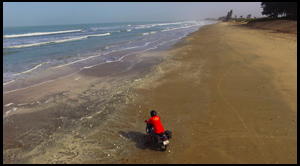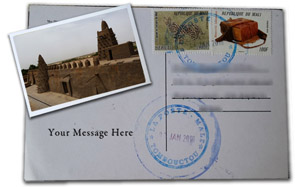I was going to sit down and write a post about being on this earth for 30 years of life, but another subject came up unexpectedly.
At some point, I will explain why and how it is that I am managing a hotel/bar/restaurant. You just need to know that this fact is foundational for the following commentary, which is largely based on my experiences in West Africa.
I have a love/hate relationship with guides. As in, tourist guides. Guides are chameleons. Ask them if something is possible, and they will always say yes. They will also join you for a beer on your dime. But you know what? Their company is often worth it.
Guides can corner you into a transaction, deftly moving between subtle tricks of psychology to get the response they want. It can be maddening, especially if you have dealt with it repeatedly over the course of 5 years.
Guides can also help you immensely. They can navigate unfamiliar lands and unfamiliar bureaucracies. They can track down the random piece of computer hardware you thought you would have to travel home for. They can weasel you out of exorbitant bribes from corrupt cops (to be fair, the lousy ones can also team up with corrupt cops to screw you over).
Guides – the good ones – make your life easier. This is how they earn their wildly inconsistent paychecks.
The thing is, some travelers show up to places and think they are in a utopian fantasy land where everyone just wants to help them. So that when a guide asks for money for a service they have rendered, the traveler gets discouraged. “Oh I thought you were just genuinely trying to help me.” Then the traveler goes on to deride the people of that country as greedy hustlers.
Don’t get me wrong, some guides are deceptive and fraudulent. You have every right to unload on a guide that employs dirty tactics. But if you send someone into town for an errand and afterwards say some bullshit like “I thought that guy was just trying to help me out. I thought he was just, you know, being nice,” someone needs to unload on you.
This may seem like a petty issue, but it has everything to do with everything. It has to do with how we talk about developing world countries, and how we interact with people when we are in those countries. Why should you be allowed to define the terms of these interactions? Because you are privileged enough to freely travel the world? You want to tell me that Malians don’t understand hospitality, because a guy who lives off of small, sporadic payments did not perform a random act of generosity for you?
You thought you could confirm your worldview when you came here, but you need to forget that worldview and start from scratch.
Side note: a somewhat related incident pushed me over the edge and led me to write this post. An expat told me that “Malians don’t have the stamina to keep promises.” !!!!!!!!!! She apparently did not know that I am married to a Malian or that I have been voluntarily living on and off in this country for 5 years.





Yep 🙂
Good post, Phil. In Amazonas, Peru, the balance is overwhelmingly tilted toward gracious hospitality and people just being kind. However, the “guide” situation is another thing. I am indeed frustrated by the paid guides who don’t in fact know how to “guide” in the wild. They get lost themselves, are unprepared, forget to consider things like potable water, and in general are extremely unprofessional. However, they are very well-intentioned and wouldn’t dream of ripping you off or taking advantage of you.
Hey Kerry, I agree completely. There is plenty of that in Mali, too. You could show up in just about any village in Mali and be offered food and a place to stay without having to pay a dime.
Word. Nice job Phil.
Most Malians are very nice, but I know from experience that if there is one thing Malians don’t like it is criticism. They just can’t deal with it. Rather than admit there is a culture of lawlessness and flashy poseurs among the young they will blame the westerners who get in trouble.
I have both good and bad experiences with guides in Mali. Good experiences were when I traveled in a group and the guides were outnumbered (and the main guide was from Sierra Leone).
When I was travelling alone I had some very bad experiences and I could write a book about what I went through when I struck up a friendship with a very nice guide who turned out to be an alcoholic con- artist.
His nickname was Pablo -from Pablo Escobar the drug lord – and that should have told me enough. He would do all kinds of things for you, and excelled at arranging things. Being bought a beer or given 1000 FCFA for these services he seemed to take as an insult. Only later I found out he was in it for the big money. He could barely afford to buy cigarettes but no sir, no chump change for him.
He had a predatory mentality and specialized in living off others. Another specialization of his was seducing rich young western ladies. He had a Canadian embassy worker girlfriend wire him money for a plane ticket multiple times to be able to come join her in Canada. Instead he repeatedly used the money to buy himself a car….
yeah, like I said, plenty of guides are terrible. I have had my fair share of run-ins, and I won’t tolerate deception and dirty tactics. That’s a different issue from what I am talking about here, though.
Thanks for the post Phil. When I was traveling in Cappadocia in Turkey I had an experience with an alternately helpful and self-serving guide. He was generally a nice enough guy, but in one of the small towns he encouraged me to buy a locally made piece of pottery that they were selling to me at what turned out to be a rip-off price. Later I was able to talk to him about it, and after pressing him he admitted I over paid but also made a case about him supporting local businesses. I was annoyed that he wasn’t MY ally as my guide, trying to help me get the best, most fair price, but I also couldn’t fault him (entirely) for having loyalty to his local town who are dependent on foreign tourists (who aren’t always reliable). It was an interesting experience. In the end I don’t regret the purchase, or the learning experience.
About your description of local guides in Mali, couldn’t this be rectified by agreeing on the terms of service in advance. For example if a guide offers to run an errand for you in town they could say “I can so that for you, no problem, for $10” (I’m making up the value). Then the recipient can decide yes that’s worth or it, or no, I can get into town on my own cheaper, I don’t need the help. But if the guide only says “I can get that for you, no problem”, then comes back and says “That will be $10”, the response is “Wait, what?”. That might be a cultural difference, bc in the US if a fee is disclosed AFTER the services are rendered it’s considered a rip off or a scam. In other countries it might be understood that a fee is implied, but not all tourists will understand that. Perhaps a savvy tourist will tactfully ask if there are any costs involved in a service that seems like it would otherwise be an extrordinary show of hospitality. Though some people who are genuinely offering a favor might be offended, it would save the surprise of being charged for something unexpectedly after it was already done.
Hey Megan,
I hear what you are saying about your experience in Turkey, and I have gone through that, too. Obviously, all services and costs should be negotiated for and agreed upon beforehand. I have just come across so many people now who don’t understand that they could be taking advantage of locals. People that just assume the service is free because someone else genuinely wants to help them. In this case, the guide assumes they will get something afterward, and the traveler doesn’t even think to make an agreement, because they think it will be free!